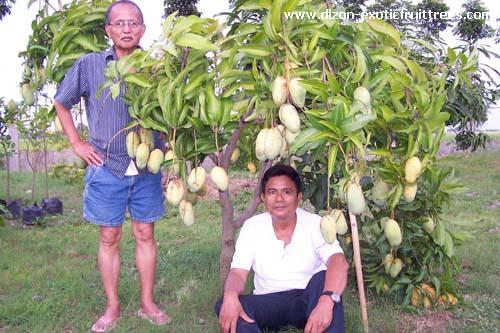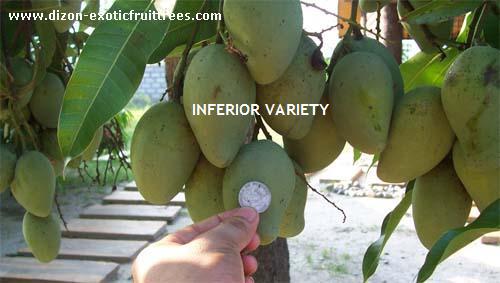|
Varietal Selections |
|
|
 |
 |
|
|
The Philippine Star - Agriculture/Evironment
Sun., Oct. 16, 2005 |
|
Chokanan
Thai honey mango shows promise
|
|
Editor:
Roman F. Floresca |
|
|
 |
Results of initial planting of double rootstock
chokanan mango show a very promising income-earner
for orchard and backyard farmer.
Five years of observation shows that chokanan mango
bears fruits continuously, prolific and heavy
fruiting even during rainy season. It has been
observed that the hot temperature during summer
months of May and June induce profuse flowering of
chokanan mango, with the fruits maturing in August
and September.
|
|
PROLIFIC VARIETY:
Justice Romeo Capulong (left) poses with his
Chokanan mango which has proven to be a fast grower
and very prolific, bearing fruit after only 18
months from planting. Also in photo is pomologist
Bernie Dizon who helped Capulong establish his
orchard in Quezon, Nueva Ecija |
|
|
There is no need to induce
flowering by spraying potassium nitrate.
Chokanan
mango is also a fast grower and bears fruit much earlier
than carabao mango. It can be planted in big containers that
will serve as decorative plants
in rooftops or in urban areas with no soil. It will flower
after 18 months from planting the double rootstock grafted
seedlings
On the other
hand carabao mango takes six years before producing 10 kilos
and fruiting season is limited to dry season only. The
flowering of carabao mango are easily attacked by
anthracnose disease that is prevalent when climate is humid
and the fruits crack when it rains. Cost of carabao mango is
very high because it needs chemicals to induce flowering up
to ripening period.
Spraying of fungicide and insecticide, foliar fertilizer is
done almost weekly which makes production cost very high for
carabao mango production.
The chokanan mango can tolerate adverse weather
conditions that even without spraying insecticide and
fungicide the flowers will develop into quality eating green
and sweet fruits that taste like honey. It has thick skin so
the fruit shelf life is longer than carabao mango and
resistant to attack of fruit fly.
The original chokanan mango tree planted at Ninoy
Aquino Parks and Wildlife was brought from Thailand to the
Philippines by Dr. Tito Aguinaldo and Dr. Vinai Klajring (a
Ph.D. alumnus of Central
Luzon State University) from his farm in Chantaburi,
Thailand. |
|
Inferior varieties of carabao mango and Indian mango
can be transformed to superior variety of carabao
mango and chokanan by means of topworking. Last
December 2004 the inferior shy bearing Batangas
carabao mango strain planted by Justice Romeo
Capulong in his orchard in Quezon, Nueva Ecija were
topworked (grafted) with scion of chokanan. |
 |
|
Photo shows an INFERIOR
BATANGAS STRAIN Carabao Mango bought from unreliable
nursery with one peso as reference size |
|
In May and June 2005 grafted
chokanan scion flowers profusely and harvested in August and
September (see picture).
Prompted by this success in topworking Arayat Mayor
Luis Chito Espino, upon the advice of orchard grower Benny
Flores, is adopting as his project the topworking of Indian
mango at the mountain of Arayat inferior mango. Espino is
worried because his townmates are cutting Indian mango trees
and converting them to charcoal which contributes to
deforestation of the mountain. Topworking of Indian mango
with chokanan will prevent deforestation and provide income
to orchard farmer. |
|
|
|
|

